CIP
International Policy Report: National Intelligence:
The dereliction of congressional oversight, May
2006

Copies
of this report are available for $2.50 each, or
$1.00 each for orders of 20 or more, from the Center
for International Policy. Request copies by e-mail
at cip@ciponline.org.
This
report is also available in printer-friendly, easier-to-read
Adobe Acrobat (.pdf)
format.
National
Intelligence:
The dereliction of congressional
oversight
By
Melvin Goodman
“There’s
a marked lack of curiosity around here.” Staff
member of House Intelligence Committee, 2005. 1
Oversight
is an essential aspect of democratic government, an
integral part of any system of checks and balances,
and central to any effort to “watch and control
the government.”2 Oversight is designed
to improve the efficiency and effectiveness of the
government, to detect arbitrary and capricious behavior,
let alone illegal and unconstitutional conduct, to
ensure compliance with legislative intent, and to
prevent executive encroachment on legislative authority.
Currently the Senate and House intelligence committees,
which were created in the mid-1970s to ensure oversight
of secret agencies, are observing all of these duties
in the breach. Senate and House intelligence chairmen,
Pat Roberts (R-KS) and Peter Hoekstra (R-MI), respectively,
have become the cat’s paw of the Bush administration
and have made sure that there is no accountability
and no criticism of any actions of the intelligence
community that could redound unfavorably on the White
House.
Over
the years, the best-known examples of legislative
oversight are the investigations by select committees
into major scandals or failures. Recent examples of
select committee inquiries have included “Watergate”
in 1972-1974, intelligence agency abuses in 1975-1976,
the Iran-contra affair in 1987, and homeland security
in the wake of the 9/11 terrorist attacks. Standing
committees have examined the sharing of intelligence
information prior to the 9/11 attacks and U.S. intelligence
on Iraqi WMD. But Congress’ current unwillingness
to investigate the torture and abuse scandals, CIA
secret prisons and extraordinary renditions, and the
NSA’s conduct of warrantless eavesdropping indicates
that the oversight process has atrophied.
There was no intelligence oversight from the agency’s
creation in 1947 until the creation of the Senate
and House intelligence committees in 1976. In the
very beginning, the intelligence community was under
the jurisdiction of the Senate and House Armed Services
Committees, but oversight was nonexistent and CIA
appropriations were hidden in the huge defense budget.
When CIA director Allen Dulles wanted $50 million
for a new headquarters building in Virginia, he visited
the chairmen of the Armed Forces and Appropriations
Committees and discussed what was needed. Dulles and
Senator Richard Russell (D-GA) drank bourbon and discussed
how many millions were needed, and Russell made sure
that Dulles left with more than was requested. The
CIA was involved in assassination plots, coups d’etat,
and various covert actions, but, according to Senator
Leverett Saltonstall (R-MA), “there are things
that my government does that I would rather not know
about.”3
It was not until 1975 that the Senate Select Intelligence
Committee (SSCI) and the House Permanent Select Committee
on Intelligence (HIPSI) were created. The decisive
event for the shift took place in 1973, when CIA director
Richard Helms deceived the Senate Foreign Relations
Committee, refusing to acknowledge the role of the
CIA in overthrowing the elected government of Chile.
Helms testified falsely that the CIA had not passed
money to the opposition movement in Chile, and a grand
jury was called to see if Helms should be indicted
for perjury. In 1977, the Justice Department brought
a lesser charge against Helms who pleaded nolo
contendere; he was fined $2,000 and given a two-year
suspended prison sentence. Helms went from the courthouse
to the CIA where he was given a hero’s welcome
and a gift of $2,000 to cover the fine.
In the wake of the Senate (Church Committee) and House
(Pike Committee) investigations of CIA abuses, the
center of gravity shifted on Capitol Hill and large
majorities in both houses favored the creation of
select committees. Senator Harold E. Hughes (D-IA)
and Representative Leo J. Ryan (D-CA) used the foreign
authorization bill to add a requirement that covert
actions, such as the operation in Chile, be reported
to Congress. According to the Hughes-Ryan Amendment,
covert actions could not be taken until a presidential
“finding” was reported to the Senate Foreign
Relations and House Foreign Affairs Committees as
well as the Armed Services and Appropriations Committees
of each house, which marked the first time that Congress
specifically ordered the CIA to report anything at
all.
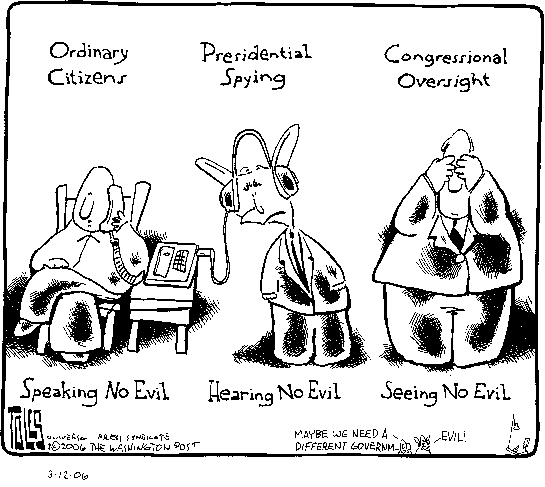 The
Church and Pike Committees called for the creation
of congressional intelligence oversight committees
and, as a result, the Senate created the SSCI in 1976
and the House created the HPSCI in 1977. The era of
intelligence oversight began when these committees
claimed jurisdiction over the Hughes-Ryan amendment
to the Foreign Assistance Act in 1974. Initially,
the Senate Armed Forces Committee, the Senate Appropriations
Committee, the Senate Foreign Relations Committee,
and their House counterparts claimed equal oversight
jurisdiction. But, in 1980, the Carter administration
created the Intelligence Oversight Act that gave exclusive
jurisdiction for oversight to the SSCI and the HPSCI. The
Church and Pike Committees called for the creation
of congressional intelligence oversight committees
and, as a result, the Senate created the SSCI in 1976
and the House created the HPSCI in 1977. The era of
intelligence oversight began when these committees
claimed jurisdiction over the Hughes-Ryan amendment
to the Foreign Assistance Act in 1974. Initially,
the Senate Armed Forces Committee, the Senate Appropriations
Committee, the Senate Foreign Relations Committee,
and their House counterparts claimed equal oversight
jurisdiction. But, in 1980, the Carter administration
created the Intelligence Oversight Act that gave exclusive
jurisdiction for oversight to the SSCI and the HPSCI.
With the creation of the oversight committees, there
was no question that the Congress had the power to
monitor the performance of the intelligence community.
The committees had the power to legislate on all matters
related to the intelligence community. The intelligence
committees authorized the budget of the intelligence
community for action by the full Senate and had the
power to investigate allegations of criminality, intelligence
failure, and fraud and abuse. The committees could
monitor the operations of the community, including
covert actions, and audited all expenditures. Finally,
the Senate intelligence committee confirmed the most
senior officials of the intelligence community, and
received prior notification of covert actions after
the president had signed the “finding.”
The committees could task intelligence community officials
to supply sensitive information needed for oversight
through printed reports, letters, testimony, and briefings.
The
“Dysfunctional” Oversight Process.
The
final report of the National Commission on Terrorist
Attacks Upon the United States (hereafter referred
to as the 9/11 Commission) was particularly critical
of the congressional oversight process, choosing to
call the process “dysfunctional,” which
is the same term the intelligence committees have
used to describe the CIA and the intelligence community.4
Over the past two decades, we have witnessed a series
of intelligence failures (e.g., the Soviet intelligence
failure, the Indian nuclear testing failure, 9/11
itself, and the run-up to the Iraq War), but there
has been no attempt by either the House or Senate
to consider serious reform.
Even with the creation of the tougher oversight process
in 1976, the CIA often chooses those events that it
does not share with the congressional committees.
In the early 1980s, CIA director William Casey did
not inform the committees that the CIA was mining
the harbor of Corinto in Nicaragua. Ten years later,
CIA directors William Webster and Robert Gates did
not inform the Congress that CIA spy Aldrich Ames
had compromised virtually every Soviet asset and every
Soviet operation. The agency also failed to inform
the committees that nearly all the major intelligence
information on Iraq in the run-up to the war in 2003
was single-source intelligence and that some of the
single-source items were from known fabricators. For
example, the agency failed to inform Congress before
its vote in October 2002 on the use of force that
the intelligence suggesting reconstitution of the
nuclear industry was a forgery and that the intelligence
on mobile biological warfare plants came from a single
source who was not trustworthy. (In February 2002
the Pentagon’s Defense Intelligence Agency had
disavowed its intelligence on the so-called links
between Iraqi officials and al Qaeda because the single-source
in that case, a Libyan named al-Libi, was an established
liar. Nevertheless, CIA director Tenet disingenuously
assured the intelligence committees in October 2002
that there was evidence of links between Iraq and
al Qaeda.)
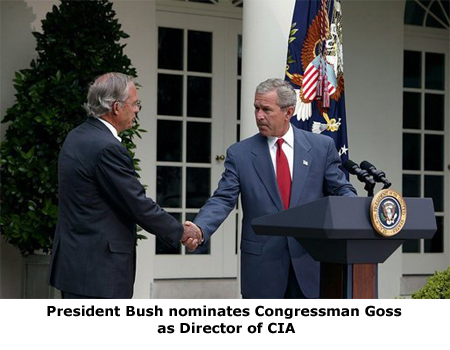 The
congressional intelligence committees neglected to
push for investigations of the abuse and torture of
detainees in CIA prisons and other overseas facilities.
Senator Carl Levin (D-MI) has won no Republican support
for his proposal to create an independent commission
to investigate treatment of detainees since 2001.
The administration’s rejection of accountability
for numerous cases of “cruel, inhuman, and degrading”
treatment of foreign detainees, and the congressional
failure to conduct oversight hearings, is a shocking
and shameful scandal in its own right. There has been
no investigation of Secretary of Defense Rumsfeld,
his senior
staff, and White House and Justice Department lawyers
who drafted or approved policies for detainee interrogations.
There has been no investigation of CIA personnel,
ranging from former director Tenet to operational
personnel in Afghanistan and Iraq, who have been involved
in the illegal hiding of “ghost detainees”
from the International Red Cross and the “rendition”
of suspects to countries that practice torture. As
a result, little or nothing is known about such CIA
practices as where prisoners are held, how many there
are, what access they have to medical treatment, and
how many may have suffered injury or death while in
the agency’s custody. The
congressional intelligence committees neglected to
push for investigations of the abuse and torture of
detainees in CIA prisons and other overseas facilities.
Senator Carl Levin (D-MI) has won no Republican support
for his proposal to create an independent commission
to investigate treatment of detainees since 2001.
The administration’s rejection of accountability
for numerous cases of “cruel, inhuman, and degrading”
treatment of foreign detainees, and the congressional
failure to conduct oversight hearings, is a shocking
and shameful scandal in its own right. There has been
no investigation of Secretary of Defense Rumsfeld,
his senior
staff, and White House and Justice Department lawyers
who drafted or approved policies for detainee interrogations.
There has been no investigation of CIA personnel,
ranging from former director Tenet to operational
personnel in Afghanistan and Iraq, who have been involved
in the illegal hiding of “ghost detainees”
from the International Red Cross and the “rendition”
of suspects to countries that practice torture. As
a result, little or nothing is known about such CIA
practices as where prisoners are held, how many there
are, what access they have to medical treatment, and
how many may have suffered injury or death while in
the agency’s custody.
The
dereliction of oversight reached its apogee in late
2002 when the Senate and House intelligence committees
made no serious attempt to vet the intelligence analysis
of the October 2002 National Intelligence Estimate
on Iraqi weapons of mass destruction. Members of the
Senate intelligence committee had commissioned the
estimate, which is unusual in itself, but few members
took the time and effort to read the finished product
or to react to the CIA’s unclassified “white
paper” of the NIE, which omitted the caveats,
subtleties, and dissents from the classified version.
The White Paper was aimed at a domestic audience and
represented policy advocacy. The NIE said that Iraq
probably could not acquire a nuclear weapon for at
least seven years, but the White Paper left out the
dates and suggested that the weapon could be acquired
imminently. The NIE contained a dissent from the State
Department on this issue, but the White Paper omitted
the dissent. The NIE incorrectly stated that Iraq
was aggressive trying to obtain high-strength aluminum
tubes for its nuclear weapons program, and the White
Paper downplayed the dissent from the Department of
Energy, the most authoritative government agency to
report on such developments.
An
excellent example of the lack of interest and curiosity
of the oversight committees is the most recent oversight
failure. In December 2005, the New York Times reported
that the Bush administration ordered the National
Security Agency in 2001 to begin warrantless eavesdropping
of American citizens, a violation of law and possibly
the Fourth Amendment of the Constitution against “undue
searches and seizures.” Bush cited his inherent
constitutional authority as commander-in-chief and
the congressional resolution in the wake of the 9/11
attacks that authorized use of force. The president
and Attorney General Alberto Gonzales also argued
that they briefed Congress a dozen times on warrantless
wiretapping, but the briefings actually involved eight
of the 535 members of Congress. It took riveting testimony
to the SSCI in 1986 to break open the illegality of
the Iran-contra operation; it will take similar testimony
to get to the bottom of the executive order to sanction
the NSA’s use of warrantless eavesdropping against
American citizens.
What
Needs to be Done?
Reform
of the oversight process could be accomplished in
large part by enforcing the system that already exists.
The congressional intelligence committees have great
powers that have been increasingly observed in the
breach. The committees legislate on all matters relating
to the intelligence community, including the most
sensitive aspects of covert action; authorize the
budget of the intelligence community; investigate
allegations of failure and fraud, let alone criminality;
confirm key members of the community; and have access
to sensitive intelligence, including reports of the
Inspector General. The oversight committees may not
be able to veto a covert action, but it is possible
for them to deny the funding for specific covert actions.
It would be foolhardy for the White House and the
CIA to proceed with a covert action that Congress
opposed.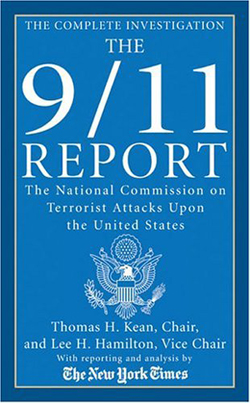
The 9/11 commission suggested important reforms for
the oversight process, but all of them were ignored
by the committees. The powerful rule of the Senate
intelligence chairman, Senator Roberts, moreover,
has kept the committee from investigating key areas
that point to an abuse of power by the White House
over the use of intelligence or by the intelligence
community itself. He recently promised once again
to hold “closed meetings to move forward”
on the administration’s manipulation of intelligence,
but gave no indication of when factual findings would
be published. With the exception of Senator Carl Levin
(D-MI), the Democratic minority has been extremely
dilatory in pursuing its legitimate interests on intelligence
matters. In the House, Representative Jane Harmon
(D-CA) has been no more aggressive than her Senate
counterpart, and has deferred unnecessarily to the
Republican chairman, Representative Hoekstra. In a
short period of time, Hoekstra has become the same
“advocate” for the intelligence community
that his predecessor, Representative Porter Goss (R-FL),
had been.
Aptly
Named “Oversight” Committee.
George Orwell certainly would have appreciated the
irony of referring to the SSCI as the oversight committee.
For the past fifteen years, there has been no end
to the examples of oversight on the part of the committee.
The Senate intelligence committee has failed to investigate
the major intelligence failures from the 1980s to
the Iraq War, including the failure to track the decline,
let alone collapse, of the Soviet Union; the Indian
nuclear test failures of 1998; and the failure to
monitor the terrorist campaign against the United
States that began with the bombing of the U.S. embassy
in Lebanon in 1983, when even high-ranking CIA officials
were killed. Certainly in a world without Orwellian
doublespeak, according to the Los Angeles Times,
the intelligence committee of Senator Roberts would
be referred to as the Senate coverup committee, although
the Senate oversight committee could serve as the
proper double entendre.5
Roberts has single-handedly kept the committee from
investigating the Bush administration’s use
of the CIA’s intelligence information in the
run-up to the Iraq War in March 2003 and the administration’s
warrantless eavesdropping program. Although the Bush
administration has resorted to a flimsy legal defense
to conduct warrantless surveillance, citing the authorization
to use force in Afghanistan in September 2001, Roberts
has done nothing to examine the NSA’s activity,
which is an obvious violation of the 1978 Foreign
Intelligence Surveillance Act, if not the prohibition
contained in the Fourth Amendment of the Constitution
against “unreasonable searches and seizures.”
President Bush and Senator Roberts are essentially
collaborating to get Congress to pass a bill ex
post facto to render the surveillance legal under
the previous FISA authority.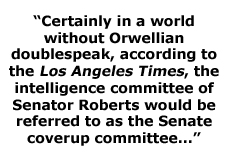
Roberts
also dragged his heels in investigating the bogus
intelligence of the CIA on Iraqi weapons of mass destruction
and finally relented only after an outside commission
headed by former senator Charles Robb (D-VA) and Judge
Larry Silberman was appointed to investigate the matter.
Roberts and former CIA director Porter Goss also collaborated
on the cover-up of the CIA Inspector General’s
accountability report on the 9/11 intelligence failure,
preventing proper distribution of the report within
the intelligence committees of the Senate and House
as well as a sanitized unclassified report, which
is customary in such events.
The
best example of the Senate intelligence committee’s
failure to pursue oversight of the executive branch
and the misuse of the intelligence community turned
on the issue of warrantless surveillance that surfaced
in December 2005. A secret intelligence court exists
to review classified applications for wiretapping
inside the United States, but President Bush signed
a secret executive agreement in September 2001 permitting
the NSA to monitor the conversations of American citizens
in the United States. Most Republican congressmen
favor an explicit authorization of such wiretapping
and an exemption of it from the 1978 law. The FBI
has already acknowledged that the NSA’s spying
inundated the FBI with thousands of leads that were
worthless.6
A
stifling partisanship within the congressional oversight
process meant that, for the first time since the intelligence
committees were formed in the mid-1970s, the Senate
failed to pass an intelligence authorization bill.
Former intelligence committee chairmen, such as Bob
Graham (D-FL) and David Boren (D-OK), remarked that
they had never witnessed such a high level of animosity
and partisanship. Ironically, former committee member
Senator Warren Rudman (R-NH) urged that “politics
should stop at the door of that committee,”
though it was Rudman who ushered in the era of partisanship
in 1991, when he accused CIA critics of the nomination
of Robert M. Gates for CIA director with “McCarthyism.”
Rep.
Hoekstra has maintained the same partisan lock on
the House intelligence committee that Roberts has
placed on the doors of the Senate intelligence committee.
Just as Roberts has blocked inquiries and investigations
of such illegal activities as warrantless eavesdropping
and torture and abuse at secret prisons, Hoekstra
has made sure that the House committee doesn’t
open any of these Pandora’s boxes. Ironically,
the House of Representatives has a procedure that
permits any congressional committee to obtain factual
information—not opinions—from the executive
branch.7 The procedure was used during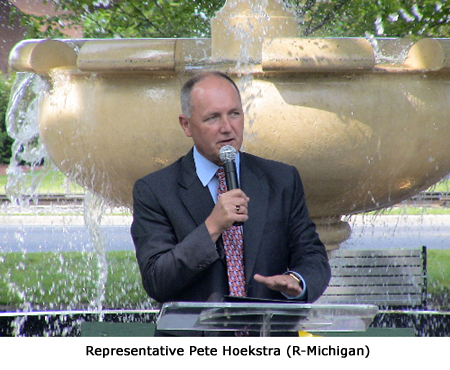 the Vietnam War to obtain access to the “Pentagon
Papers,” the Defense Department study of U.S.-Vietnamese
relations, and information on CIA covert operations
in Laos.8 When the United States fought
a secret war in Cambodia during the Vietnamese War,
it took a congressional inquiry to learn the number
of U.S. sorties and the tonnage of bombs and shells
fired and dropped during certain periods. A month
before the Iraq War, Representative Dennis Kucinich
(D-OH) used a resolution of inquiry to obtain a 12,000-page
Iraqi declaration on its weapons of mass destruction,
which turned out to be far more accurate than CIA
declarations on Iraqi WMD. A resolution of inquiry
would be an effective device for gaining more information
on such controversial issues as CIA extraordinary
renditions and secret prisons, which Hoekstra refuses
to investigate.
the Vietnam War to obtain access to the “Pentagon
Papers,” the Defense Department study of U.S.-Vietnamese
relations, and information on CIA covert operations
in Laos.8 When the United States fought
a secret war in Cambodia during the Vietnamese War,
it took a congressional inquiry to learn the number
of U.S. sorties and the tonnage of bombs and shells
fired and dropped during certain periods. A month
before the Iraq War, Representative Dennis Kucinich
(D-OH) used a resolution of inquiry to obtain a 12,000-page
Iraqi declaration on its weapons of mass destruction,
which turned out to be far more accurate than CIA
declarations on Iraqi WMD. A resolution of inquiry
would be an effective device for gaining more information
on such controversial issues as CIA extraordinary
renditions and secret prisons, which Hoekstra refuses
to investigate.
Meanwhile,
the intelligence committees have not challenged the
efforts of the Bush administration to restrict the
need to know of the American people. In 1999, four
years after the Clinton administration signed a declassification
order, the CIA, the Defense Intelligence Agency, and
several other agencies began removing thousands of
historical documents from public access, including
documents that had been published by the State Department
and photocopied by private historians.9
Some of the documents were decades-old reports from
the Korean War and the early days of the Cold War.
The Bush administration accelerated the process when
it came into office, and the impact of the 9/11 attacks
put the program into high gear. The program has revoked
access to approximately 9,500 documents since its
inception, and more than 8,000 of these documents
have been removed since the Bush administration came
into power. There clearly has been a marked trend
toward greater secrecy in the Bush administration
that has increased the pace of classifying documents,
slowed declassification, and discouraged release of
some material under the Freedom of Information Act.
The CIA under Porter Goss went even further, denying
publication of materials that have no security classification
and preventing CIA officials from addressing open
meetings of academic associations. He also threatened
the possibility of grand jury investigations in which
reporters would have to reveal their sources of classified
information or risk prosecution for espionage.
Meanwhile,
the intelligence committees have done nothing to challenge
the efforts of the White House to shut off the flow
of national security information to the American public.
The White House and the Department of Justice are
even using an espionage law from the days of World
War I to prosecute two pro-Israeli lobbyists for receiving
classified information from a Pentagon official who
was sentenced to twelve years in prison in January
2006. The two lobbyists, Steven Rosen and Keith Weissman
of the American Israel Public Affairs Committee, are
facing jail sentences that would have a chilling effect
on debate over national security issues. This would
represent the first time that any administration has
tried to stifle debate on national security issues
by criminalizing the receipt of oral information as
part of a lobbying or reporting process.
In addition to blocking any serious investigations
of the misuse of intelligence, the Senate and House
intelligence committees also have blocked the Government
Accountability Office, the investigative arm of Congress,
from monitoring the effectiveness of the nation’s
intelligence agencies. The GAO is uniquely qualified
to investigate the world of intelligence; it has more
than 150 officials who are able to audit intelligence
information, but it has not audited the CIA or the
NSA since the 1960s. In the mid-1970s, the Pike Committee,
which investigated the intelligence community recommended
that the GAO should have the same authority to investigate
and audit intelligence as other agencies. But the
GAO needs authorization from Congress to begin an
investigation, and the oversight committees have been
particularly quiet since the intelligence failures
that accompanied the 9/11 terrorist attacks. Both
Roberts and Hoekstra have stated that they have their
own audit staffs within the intelligence oversight
committees and have no need for GAO involvement.
Unless the congressional oversight process returns
to its bipartisan or nonpartisan roots, recruits an
expert professional staff with the instincts of junkyard
dogs, accepts the fact that objective, balanced intelligence
analysis is just as important as clandestine operations,
and appoints chairmen who do not see themselves as
“advocates” for the intelligence community,
the CIA and other intelligence agencies will not receive
the guidance and monitoring they sorely require. With
the dangerous increase in unchecked presidential power
and the incompetence of the intelligence community
prior to the 9/11 attacks and the Iraq War, the restoration
of congressional intelligence oversight is essential
to American national security.
Footnotes
1 Pat M. Holt, “Congress Partly to
Blame for Bush’s Warrantless Wiretaps,”
Christian Science Monitor, January 5, 2006,
p. 15.
2 John Stuart Mill, Considerations
on Representative Government, London: Parker,
Son, and Bourn, 1861, p. 104.
3 Mark M. Lowenthal, Intelligence:
From Secrets to Policy, Washington, DC: The CQ
Press, 2000, pp. 141-142.
4 See The Final Report of the National
Commission on Terrorist Attacks Upon the United States,
Washington, DC: U.S. Government Printing Office, 2004.
5 “Advise and Assent,” editorial,
The Los Angeles Times, February 19, 2006,
p. 6.
6 Lowell Bergman, Eric Lichtblau, Scott
Shane, and Don Van Natta, Jr., “Spy Agency Data
after Sept. 11 Led FBI to Dead Ends,” The
New York Times,
January 17, 2006.
7 Louis Fisher, “House Resolutions
of Inquiry,” Washington, DC: Congressional Research
Service, May 12, 2003.
8 Fisher, “Resolutions of Inquiry,”
p. 17.
9 Scott Shane, “U.S. Reclassifies
Many Documents in Secret Review,” The New
York Times, February 21, 2006, p. 1.
|









